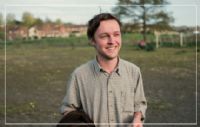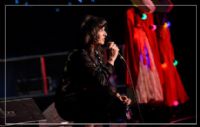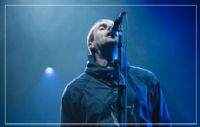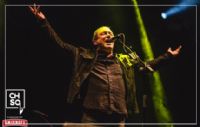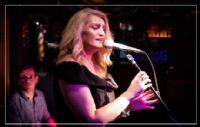Utopia & Reality, City Of Derry International Choral Festival 2015
Date: 27/10/2015
Gig Review
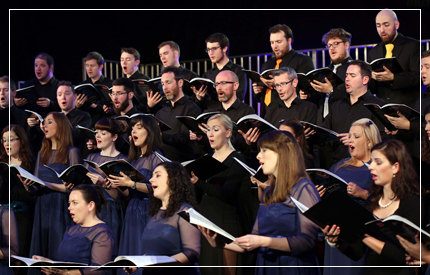
The Utopia & Reality chamber choir are the brainchild of Norwegian conductor Ragnar Rasmussen and Slovenian conductor Ursa Lah. In bringing together young singers from Norway, Slovenia, Serbia, Italy and Iceland, they have sought to explore different ways of connecting with audiences on an artistic and emotional level.
It is something they achieve to great effect in tandem with Donal Doherty's internationally acclaimed Codetta choir, warming both hearts and minds on a cold autumn evening during the City Of Derry's third International Choral Festival.
As has always been the case during evening festival events, the rear of the St. Columb's Hall stage is bathed in welcoming blue light, the very kind that the audience surely appreciates. Tonight, three brand new works by composer Gary Carpenter receive their world premiere: words from William Shakespeare are performed in song by Utopia & Reality and Codetta.
"Alack", inspired by Love's Labour's Lost, fittingly ebbs and flows. A steady piano fluctuation inspires an equally fluctuating harmony which spreads around neatly so that male and female singers can be evenly expressive with their vocals.
The descriptive "Cleo", by contrast, sounds like an early evening wake up call for people worn down by a long day. The concentrated midsection of this Antony And Cleopatra-inspired work is gently penetrating, leading to a delicate, tenor-led fade out.
Finally, in "Sigh-Fie", The Merry Wives Of Windsor and Much Ado About Nothing are brought together in a well-balanced combination of mirth and mischief. It is an interesting experiment in bardic balladry; one gets the feeling that both Gary Carpenter and these choirs have so much more to offer us.
Nonetheless, the remainder of the programme, led by Utopia & Reality themselves, is packed with variety. As they begin performing a mixture of works by Finnish composer Einojuhani Rautavaara and Slovenian composer Lojze Lebic, the choir step away from the stage and sing around the audience, achieving an emotionally satisfying chapel-esque affection. The men are strong and the women versatile, aptly adapting to slow tempo drops in volume, sudden rises up the scale and brief operatic solos amidst imperious overlapping chords.
At this stage there is an intricate interlock, with the women most prominent, a sign that Utopia & Reality are mastering their surroundings. What keeps one focused is how the choir, be they on the stage or off it, convey every feeling on the emotional scale. Any solemnity on their faces has been reflective not of gloom, but concentration: so far, the appeal of the evening has been more aural than visual.
That is, until percussion and physicality come into play just before the interval. Unleashed from their rather regimented if undeniably impressive choruses, the choir literally begin to act, spacing out around the stage, moving their hands, singing in staggered jolts and emoting in whispers. It is a very risky tonal shift but it delights rather than detracts, injecting the evening with life and introducing Utopia & Reality's penchant for childish and cheery theatrics.
One suddenly sees a brave choir winning a battle with tone and temperament, and this is maintained as they perform a series of hugely enjoyable Scandinavian works, mostly by Rasmussen himself, in the second half of the concert.
Arguably, these pieces are more challenging for the choir and the audience, as we must slowly become accustomed to expecting the unexpected. But Utopia & Reality are more than up to this challenge, especially during a potentially unsettling jungle beat which, with the help of thunderous drums, unifies and excites.
By evening's end, one is in awe of Utopia & Reality's command of their sound, sound effects and emotional messages. The utopia in their singing is never hidden by the reality, or vice versa: in a manner worthy of their title, they are always Utopia and Reality. Never one or the other.
Simon Fallaha
Photo by C. Lorcan Doherty Photography
It is something they achieve to great effect in tandem with Donal Doherty's internationally acclaimed Codetta choir, warming both hearts and minds on a cold autumn evening during the City Of Derry's third International Choral Festival.
As has always been the case during evening festival events, the rear of the St. Columb's Hall stage is bathed in welcoming blue light, the very kind that the audience surely appreciates. Tonight, three brand new works by composer Gary Carpenter receive their world premiere: words from William Shakespeare are performed in song by Utopia & Reality and Codetta.
"Alack", inspired by Love's Labour's Lost, fittingly ebbs and flows. A steady piano fluctuation inspires an equally fluctuating harmony which spreads around neatly so that male and female singers can be evenly expressive with their vocals.
The descriptive "Cleo", by contrast, sounds like an early evening wake up call for people worn down by a long day. The concentrated midsection of this Antony And Cleopatra-inspired work is gently penetrating, leading to a delicate, tenor-led fade out.
Finally, in "Sigh-Fie", The Merry Wives Of Windsor and Much Ado About Nothing are brought together in a well-balanced combination of mirth and mischief. It is an interesting experiment in bardic balladry; one gets the feeling that both Gary Carpenter and these choirs have so much more to offer us.
Nonetheless, the remainder of the programme, led by Utopia & Reality themselves, is packed with variety. As they begin performing a mixture of works by Finnish composer Einojuhani Rautavaara and Slovenian composer Lojze Lebic, the choir step away from the stage and sing around the audience, achieving an emotionally satisfying chapel-esque affection. The men are strong and the women versatile, aptly adapting to slow tempo drops in volume, sudden rises up the scale and brief operatic solos amidst imperious overlapping chords.
At this stage there is an intricate interlock, with the women most prominent, a sign that Utopia & Reality are mastering their surroundings. What keeps one focused is how the choir, be they on the stage or off it, convey every feeling on the emotional scale. Any solemnity on their faces has been reflective not of gloom, but concentration: so far, the appeal of the evening has been more aural than visual.
That is, until percussion and physicality come into play just before the interval. Unleashed from their rather regimented if undeniably impressive choruses, the choir literally begin to act, spacing out around the stage, moving their hands, singing in staggered jolts and emoting in whispers. It is a very risky tonal shift but it delights rather than detracts, injecting the evening with life and introducing Utopia & Reality's penchant for childish and cheery theatrics.
One suddenly sees a brave choir winning a battle with tone and temperament, and this is maintained as they perform a series of hugely enjoyable Scandinavian works, mostly by Rasmussen himself, in the second half of the concert.
Arguably, these pieces are more challenging for the choir and the audience, as we must slowly become accustomed to expecting the unexpected. But Utopia & Reality are more than up to this challenge, especially during a potentially unsettling jungle beat which, with the help of thunderous drums, unifies and excites.
By evening's end, one is in awe of Utopia & Reality's command of their sound, sound effects and emotional messages. The utopia in their singing is never hidden by the reality, or vice versa: in a manner worthy of their title, they are always Utopia and Reality. Never one or the other.
Simon Fallaha
Photo by C. Lorcan Doherty Photography





























